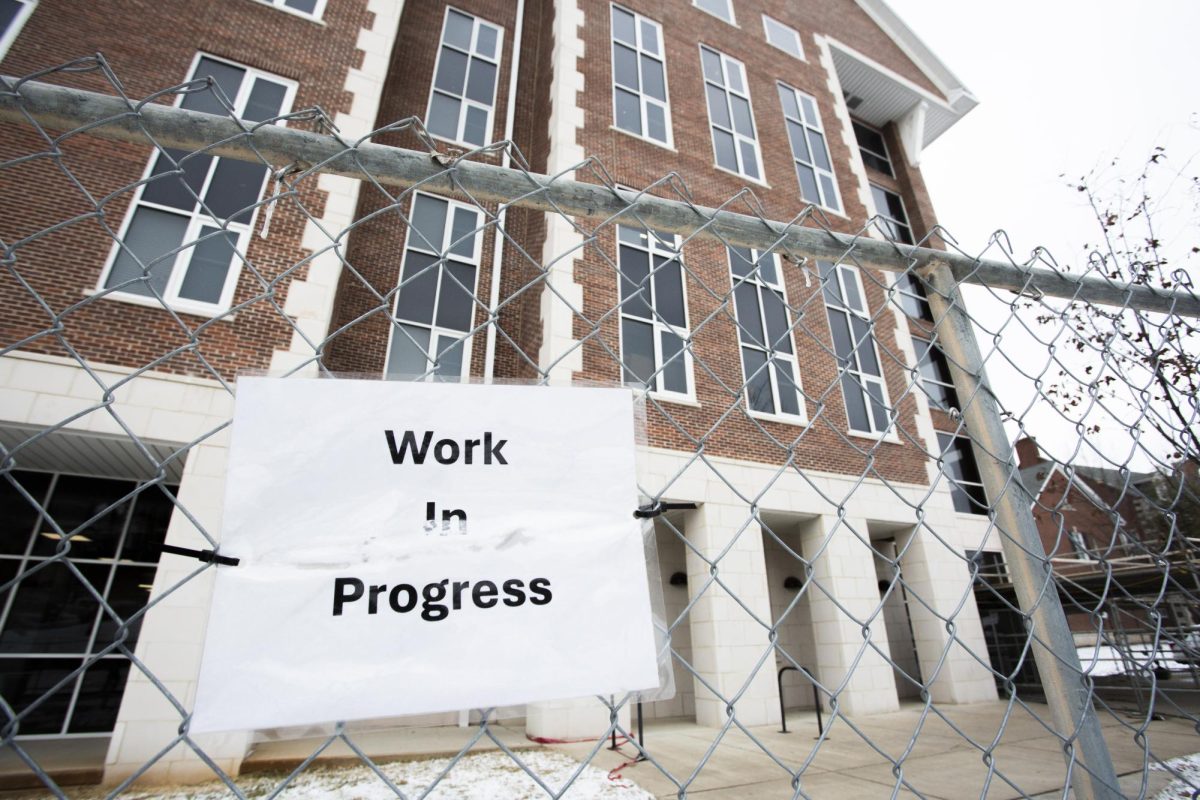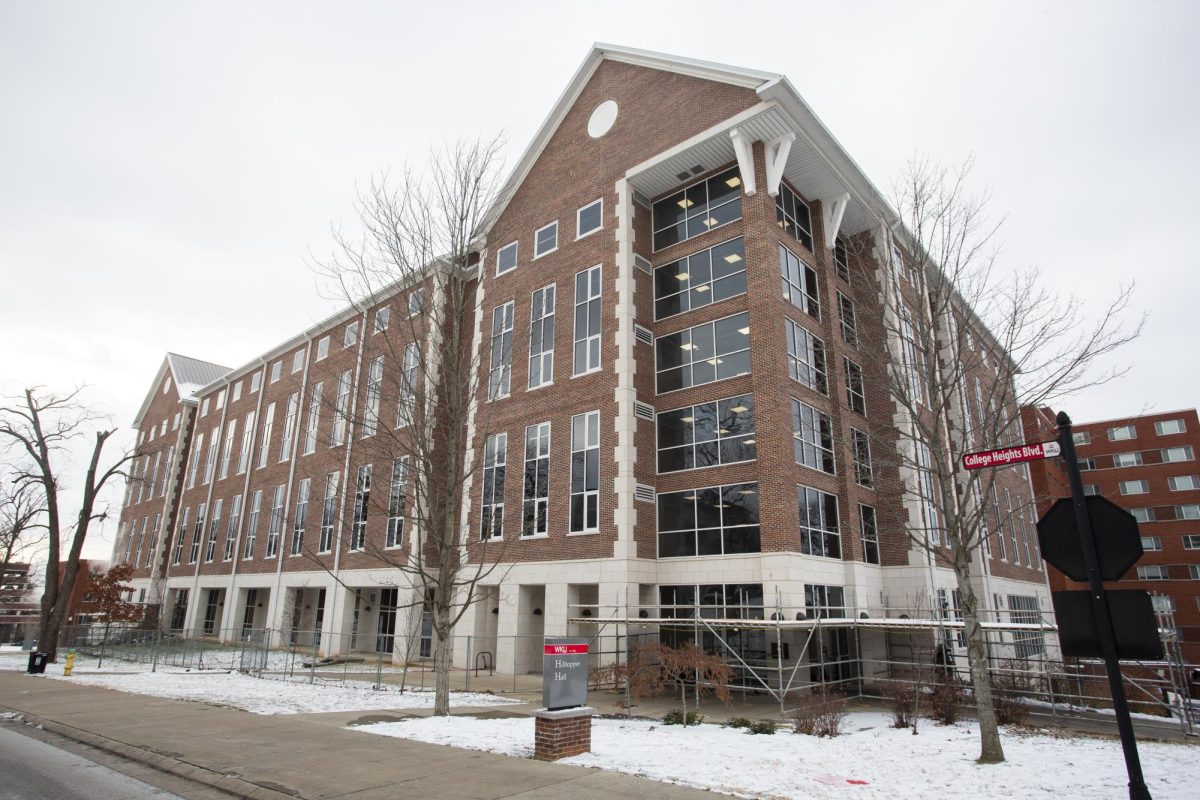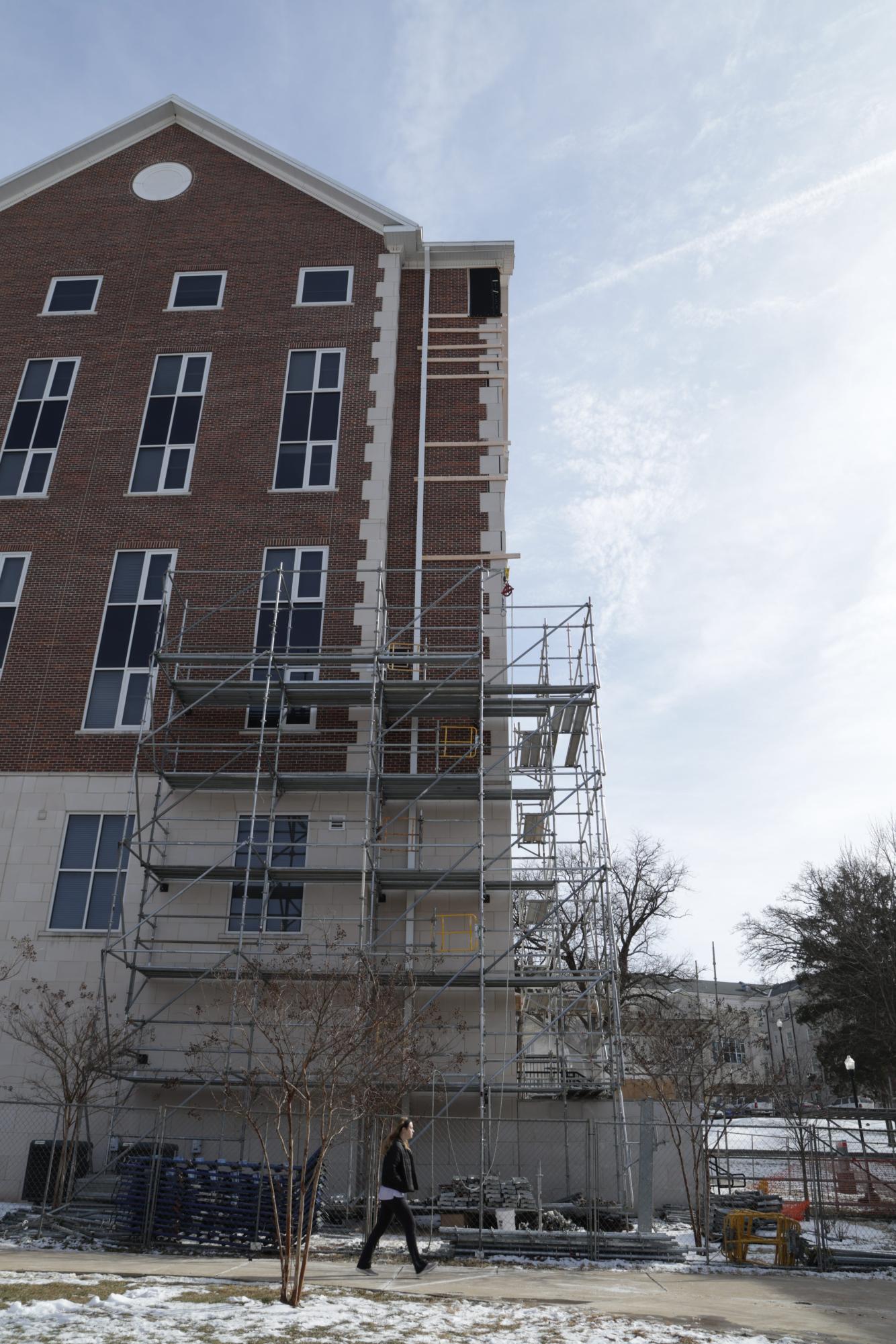Your dorm room on the Hill is not owned by WKU.
Rather, it’s owned by the WKU Student Life Foundation, a nonprofit, nonaffiliated, tax-exempt corporation created in 1999 that has owned, operated, torn down old residence halls and built new ones since the university turned over the residential buildings and the land they stand on.
“Clearly our biggest challenge was the condition of our residence halls,” Gary Ransdell, WKU’s president when the foundation was created, said. “Most of them are pretty old and [in] pretty poor condition … We had to figure out a way that we could improve our campus residence life environment across the board.”
The Foundation is also in charge of all residence hall construction and renovation and hiring the general contractors who oversee these projects.
Over recent weeks, construction and maintenance issues across WKU’s residence halls have greatly impacted students, with the peak of this disruption caused by construction flaws in Hilltopper Hall, the $26 million, 400-bed residence hall that opened in 2018.

Following the discovery of the flaws by the Student Life Foundation after an assessment of the building from architects and civil engineers, the hall was ordered to close by Feb. 4, to investigate and repair the problems.
According to the 2021 Student Life Foundation 990 tax form, it was created “to facilitate the purchase, recapitalization and renovation of the student residential facilities.” It currently owns and operates 16 residence halls and approximately 5,236 beds on the main campus.
Ransdell explained that an issue in renovating and improving residence halls was that funding had to come from the state – the same as renovations and replacements for academic buildings on campus.
“We determined that we needed to reserve our state funding and pursuit of support from the state for capital projects for our academic priorities,” he said.
Ransdell said the Foundation created a “dynamic” that is the norm on private university campuses, but unusual for public universities. None of Kentucky’s other universities have this arrangement.
When the Student Life Foundation took control of the residence halls, they no longer had to “compete” with WKU’s academic state funding priorities over the same period of time.
“By getting our buildings out of state ownership, we then could control the revenue, the work and expedite that schedule,” Ransdell said. “Whereas if those buildings were still owned by the state, then we’d have to sequence properties that we were seeking state funding to improve.”
He called the decision to start the Foundation “very fortuitous.” Not only did residence halls no longer compete for funding, but revenues earned from students living on campus began going back into improving the properties.
“The revenue from what students were paying to live in residence halls was not going back into improving those properties, which is among the reasons why they were in such deteriorating condition,” Ransdell said. “So we made the decision to marry revenue from residence halls to the continual improvement of those properties.”
Making this change, Ransdell explained, proved to be a good way to renovate, replace and build new buildings. He said the “money goes right back into our residence halls” which is why they provide a “pretty high quality of life.”
“Motivation for me was determined that by improving our residence halls, we could turn a student recruiting disadvantage of deteriorative residence halls into a recruiting advantage,” Ransdell said.
For some public universities, they chose to have private companies own their residential facilities, and the property is given back to the university once it is paid off. However, Ransdell said by the time the property is given back in 25 or 30 years, it would need renovations, which would put the university
in debt. The Student Life Foundation method avoids this.
“The university is going to be stuck with that debt, to renovate those properties that they were not able to collect revenue from for all those years,” Ransdell said. “So that’s a very challenging financial dynamic.”
Ransdell said the biggest risk with the Foundation was the removal of university ownership of the residence halls.
“We’ve put a lot of trust in the Student Life Foundation board to manage these properties,” he said. “But we’ve had great, loyal alumni serving on that Student Life Foundation Board, who have good financial experience. And, to my knowledge, at least, certainly while I was involved, really did a terrific job of managing both the construction projects and the finances in a pretty complex, multimillion dollar enterprise.”
Despite its technical separation from the university, the Student Life Foundation works closely with other on-campus departments involved with the residence halls, such as Housing and Residence Life and facilities management.
“The Student Life Foundation exists to serve the university and to ensure
a high quality of life for our students. That’s why they exist,” Ransdell said. “So of course, there’s going to be close cooperation between the Office of Housing and Residence Life on campus and the Student Life Foundation. They’ve got to work hand in glove.”
Brad Howard, chair of the Student Life Foundation board and president of Warren County Independence Bank, explained the primary benefit of the foundation to WKU is the funds generated that are invested back into the residence halls rather than the general fund of the school.

“At the time, the laws at the state level allowed us, when they put us into a separate legal entity, to restructure the debt that we had on the residence halls using bonds instead of traditional financing,” Howard said. “And because of that, it enabled us to get longer term lower fixed rates … all the money that we made is turned around and invested back into the residence halls.”
Howard believes the current arrangement between WKU and the Student Life Foundation has been successful, and that it will continue to be.
“We’ve done very well, and we’ve been able to update and do some other things with new construction, the freshman village, in particular,” Howard said.
Tad Pardue, general counsel for the Student Life Foundation, said that in the management agreement, there is an “exclusive option” for the university to repurchase the residence halls. However, Pardue and Howard explained this is not something that has been discussed.
“That’s something [the exclusive option] that is available to the university should they want to exercise it … I don’t think that’s really been on the radar, on the horizon or been discussed,” Pardue said. “It seems as though both the university and the Foundation are pleased with how the relationship is working and see the mutual benefit each derives from the other.”
Currently, the Student Life Foundation has third-party architects and engineers still investigating Hilltopper Hall. It was the preliminary reports that provided concern for further investigation, as well as the necessary relocation of student residents from the hall.
Pardue explained that a “considerable amount of time and work and effort” was placed into the building analysis of Hilltopper Hall, in which experts made a recommendation to continue analyzing the building. This also resulted in the relocation of its 388 residents.
“The board of the Foundation was acting on those experts’ recommendations, that at least for the time being, that the residents will be relocated,”Pardue said. “I just want to emphasize that the board’s decision was in reliance upon the opinions of those experts. It wasn’t necessarily the board’s decision in a vacuum to relocate.”
The architects working to identify the issues of Hilltopper Hall now are not the original architects from when it was first constructed, yet the original construction members are still part of the conversation.
“Now, we are engaged in conversation and dialogue with the project engineer, architect and general contractor [from the original construction] where we are requesting information from them, speaking with their representatives, working with them to try to determine if anything was done incorrectly and who ought to be responsible,” Howard said.
He expressed appreciation for the students living in Hilltopper Hall that have to depart and find other housing. At this point and based on current information, he said it was the best thing to do for these residents.
“I can’t say enough how much careful deliberation was had by the board prior to arriving at the decision that it made,” Howard said. “All of that was taken into consideration, and they fully and completely understand the imposition that this has made on students and families at the university.”
For sophomore exercise science major and Hilltopper Hall resident Isaiah Coats, moving his items out of his room right after moving back in for the spring semester has been worrisome.
“The most upsetting part is the fact that it feels like this place I got comfortable with and called home is crumbling,” Coats said. “I’m handling the moving process just fine, I’ve accepted the situation, [but] a lot of people here are still in shock.”
Coats plans to move with the help of friends and family. He highlighted that “most of us [residents] are going to McCormick.” Relocated students will receive a full credit of the Hilltopper Hall housing charge, $4,086, which will first be applied to any new housing charges for those remaining on campus, be applied to unpaid account balances and finally be released to the student if there are still excess funds.
Jace Lux, university spokesperson, stated via email there will be consistent communication from WKU Housing and Residence Life about next steps for the hall and its residents.
“The investigative work on Hilltopper Hall continues,” Lux stated. “WKU HRL will communicate with residents about next steps once more is known about the scope of the corrective work to be performed.”
Additional reporting by Kaylee Hawkins. Editor-in-Chief Alexandria Anderson can be reached at [email protected].




